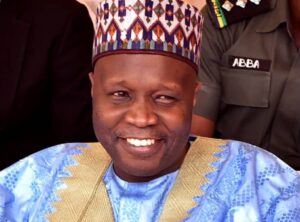
 Gombe state with a population of 3.25 million as of 2016 was created on Oct.1, 1996 from the present Bauchi State by the then Military regime of now-late Gen. Sani Abacha.
Gombe state with a population of 3.25 million as of 2016 was created on Oct.1, 1996 from the present Bauchi State by the then Military regime of now-late Gen. Sani Abacha.
The northeastern state is bordered to the north and northeast by Borno and Yobe states, to the south by Taraba, to the southeast, by Adamawa, and to the west by Bauchi state.
Without some natural endowments to trigger its rapid economic growth such as a seaport, an international airport, or a big market as in Kano, Onitsha and Maiduguri, many regarded Gombe as a no-go area for investors.
However, on an assumption of office in May 2019, Gov. Inuwa Yahaya moved to change the narrative by laying the foundation of a new Gombe state by producing a transformation blueprint that has ushered in a new era.
The initiative has begun to make an impact as the state has won the World Bank’s States Fiscal Transparency, Accountability, and Sustainability (SFTAS) Award in four key categories.
This is because the reforms have impacted positively on its fiscal transparency and accountability in public resource management.
SFTAS motivates states in Nigerian towards improvement in their Public Financial Management systems, processes and institution aimed at strengthening fiscal transparency.
It helps to help build trust in government, facilitate accountability in public resource management, and ensure sustainability in the participating states.
Observers of developments in Gombe attribute the feat to the political will and determination of Yahaya to reform and reposition the state’s public finance management structure in line with international best practices.
The current status of the state is also attributed to the governor`s support for the committee vested with the mandate to implement policies and procedures that ensured the state met all requirements attached to the Disbursement Linked Indicators (DLI’s) under the SFTAS programme.
The governor has enthroned a durable system that instills probity, transparency accountability, due process and the rule of law in governance.
Recently, the state moved four places, from 11th position in 2021 to 7th in 2022, in the Transparency and Integrity Index released by the Centre for Fiscal Transparency and Integrity Watch (CeFTIW).
Although Gombe has not magically transformed into a global investment hub, the efforts made by the state government has caught the attention of relevant authorities, it continues to lay the foundation to build investors’ confidence.
Vice-President, Yemi Osinbajo, at a three-day investment summit in Gombe, said the state’s ranking on the ease of doing business and investment-friendly ecosystem indexes are have led cumulated investment pledges and the signing of agreements.
Investment experts have also applauded the state government’s vision to produce a 10-year development plan – Medium Term Expenditure Framework (MTEF) and determination towards creating an enabling business environment as key Gombe’s economic growth.
The 2021 State-of-the-states report published by BudgIT, a leading fiscal policy tracking organisation in Nigeria, indicated that Gombe state fared impressively in its revenue generation capacity and expenditure efficiency under Yahaya.
Gombe State is leading a path towards economic recovery in Nigeria’s northeast region and highlighting its own potential through the investment summit held by the state government.
The summit is a deliberate step to shape the state into an attractive investment destination and to attract investors.
Alhaji Muhammad Magaji, the state Commissioner for finance, said the state has been working in recent years to be investors-ready
He said the state’s financial reforms and how it has been able to block leakages amongst others has helped investors to have more confidence in the state.
“We have better roads, electricity, water, and healthcare. If you are well, you are able to do business, and that is one of the reasons why we came top in the ease of doing business in 2021“, he said.
He observed that the place of Gombe in commerce, industry and tourism is well established, as throughout history, adding that the state has continued to capture the attention of traders and business caravans from within and outside Nigeria.
“Our position is boosted by Gombe’s strategic location at the center of the north-east sub-region and proximity to neighboring countries around the Lake Chad basin.
“We have an enterprising and peace-loving population, unity in diversity, comparative advantage in agriculture, commerce, and abundance of natural resource like limestone, gypsum, uranium, coal, crude oil, kaolin, etc.”, he said.
He said that the state also boasts of great potential in irrigation and hydropower generation through the Dadin Kowa, Balanga and Cham dams”.
The drive to make Gombe state an investor`s haven has driven the governor beyond local investors to foreign.
Recently, he received in audience, Mr Yanko Yordanov, the Ambassador Extraordinary and Plenipotentiary of the Republic of Bulgaria to Nigeria.
The Envoy, in company of other Bulgarian diplomats, held talks on the excellent Bulgaria-Nigeria bilateral ties to explore areas of mutual interest in trade, industry, agriculture among others in the.
The state has continued to woo investors and partners to take advantage of the conducive environment, incentives, facilities and other available opportunities to drive sustainable development.
Recently, government launched a special security task force code-named Operation Hattara for the purpose of reinforcing security architecture in and around the state.
There is no doubt ease of doing business in Gombe state, when fully consummated, will improve the standard of living of people of the state. It is one area of governance other states of the federation must emulate.
CREDITED: Joseph Edeh, News Agency of Nigeria (NAN)






















